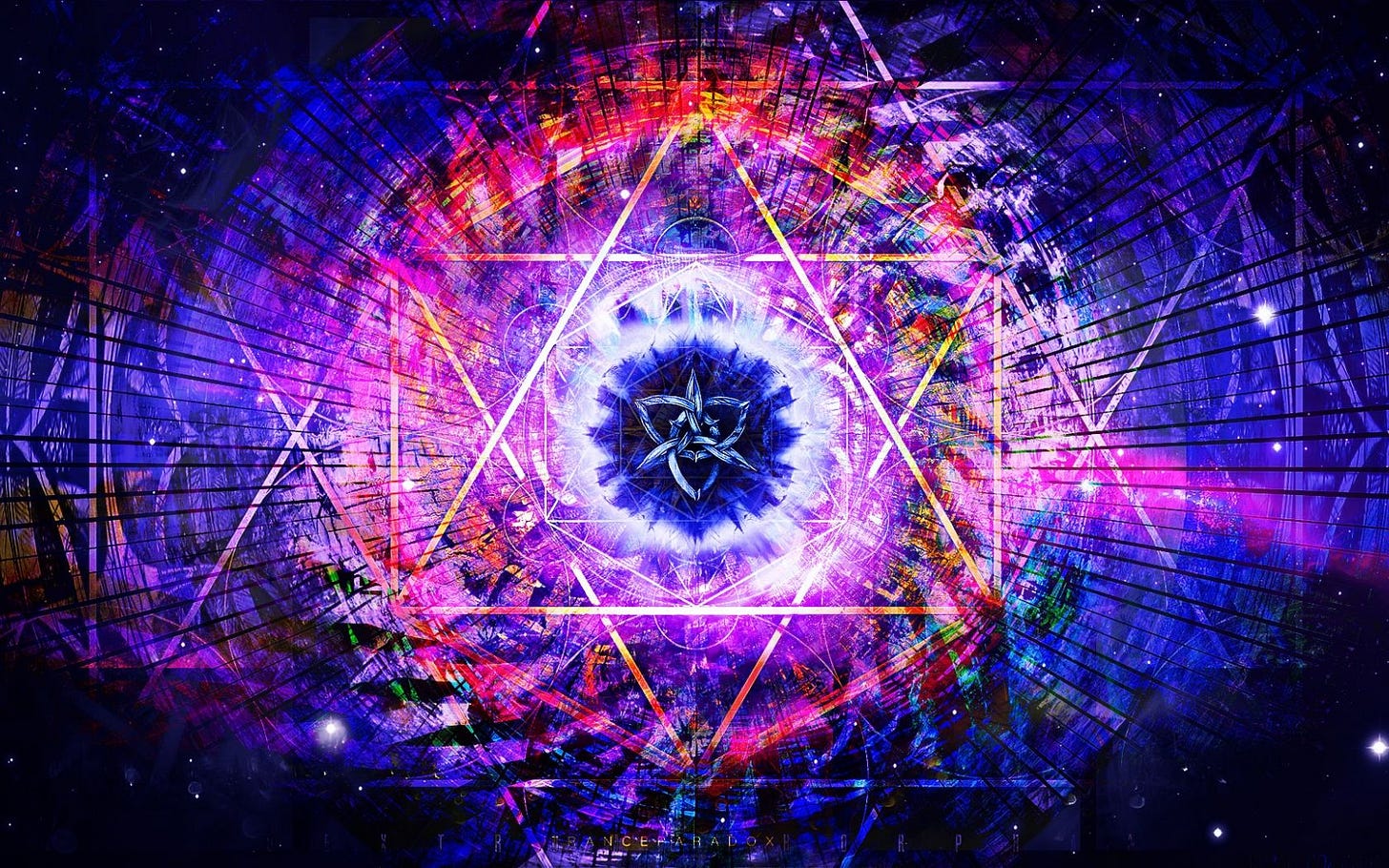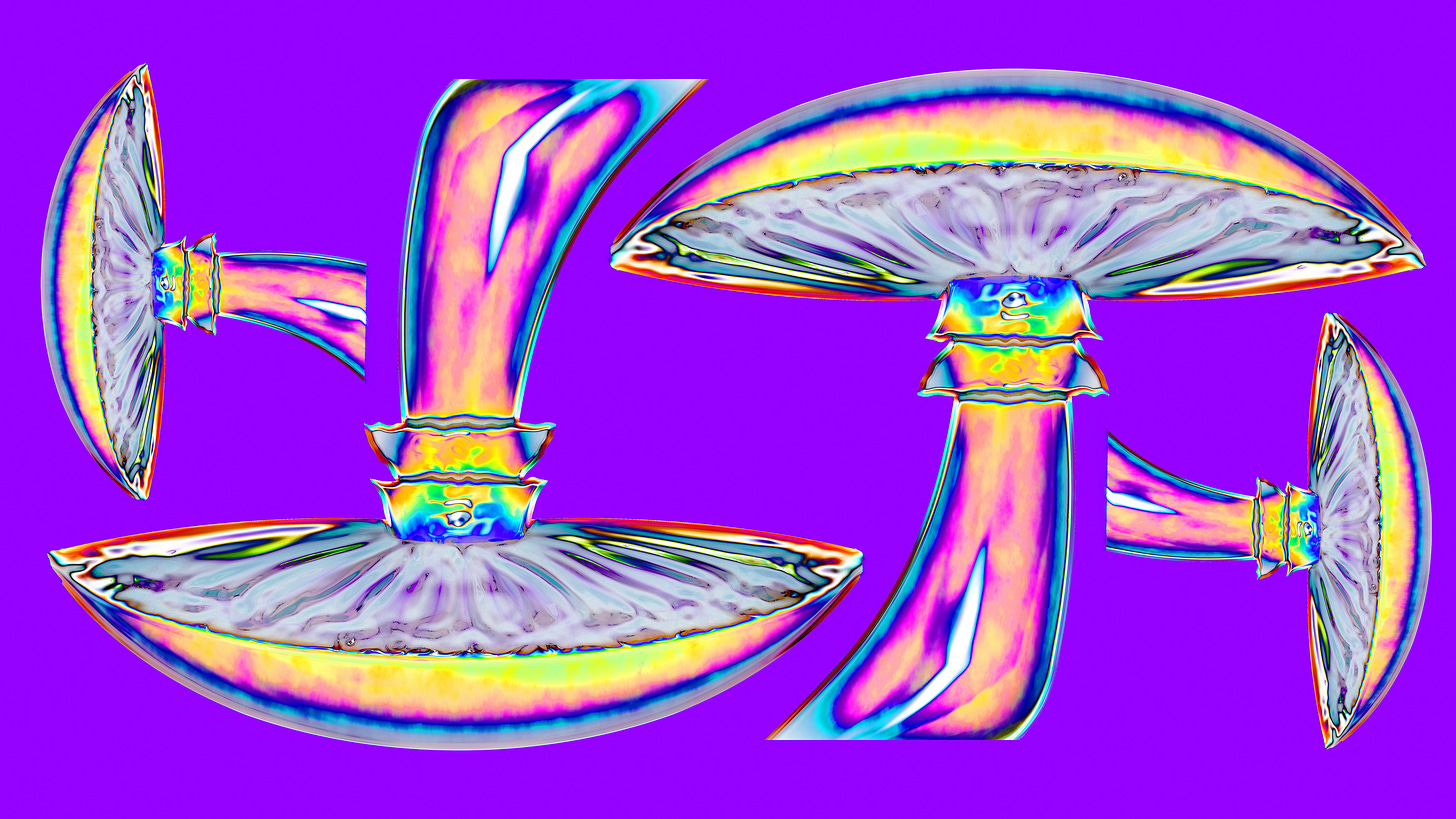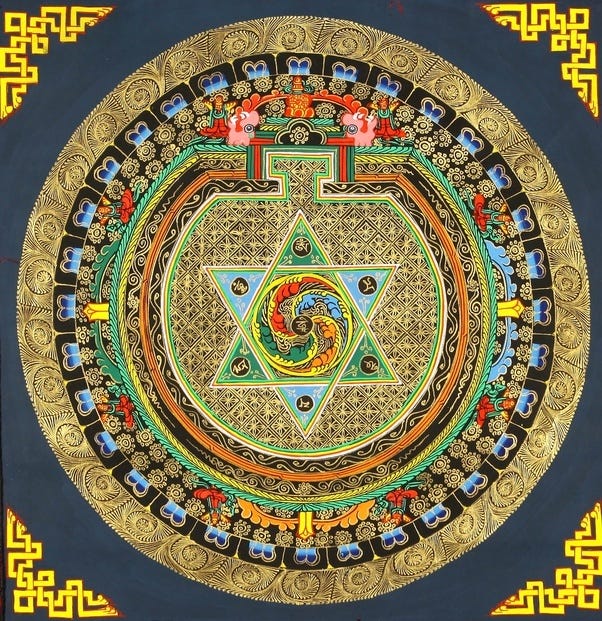Do Religion and Psychedelics Mix?
Eight questions for a Psychonaut Rabbi.
Image: wallpaperaccess.com
1. Why is our culture currently living through an epidemic of anxiety?
This isn’t a novel idea, but it’s clear that we live in a post-traumatic world. We always have, and now many more people know that no one is immune to it. Our climate crisis is already making certain parts of the world uninhabitable faster than others, and our institutions are failing more people than they have previously. Humanity still does not possess good enough social media hygiene to know how it is entrancing and enticing us to leverage our latent fears, biases, and dispositions for the gain of corporate and political entities. Instead of these issues leading us to recognize that we are all in this together, we are more often led to believe that we are alone and alienated in our suffering and there is no hope and healing in this regard.
2. Have traditional psychology and pharmacology failed as treatment methods?
Many people have received much-needed help and support from modern psychology and pharmacology, so it’s beyond me to disparage them entirely! Rather, I hope both methods make more room for other avenues of healing, such as embodied and somatic work, working with archetypal and transpersonal content, and spiritual emergence. These approaches acknowledge and honor many more dimensions of human experience and psyche than traditional Western approaches allow.
Whatever the failings of these modalities, we cannot lay all of the blame for the ongoing decay of mental health in our society. Housing and wage insecurity, a justice system that works for the few, the cost and reliability of health care, and nourishing food all foster a sense of safety and security. Let’s not forget that every human being just experienced our society’s near collapse just a couple of years ago! Talk about trauma. Perhaps whatever failings of mental health care exist, they reflect the conditions of our larger systems, not the problem itself.
3. You’ve discussed the thoroughness of the secularization of Western Culture (including among spiritually-minded people). Where do you most observe this, and what do you see as the implications of it?
It’s not a big secret that liberalism, rationalism, and the scientific revolution completely changed the course of human civilization since its inception by liquidating the sacred animism present in our lives into sociological and psychological phenomena. Aside from aboriginal or most indigenous cultures that have had little to no contact with modern society, the human mind has evolved, for better or worse, along those lines.
Even in the most traditional cultures where divinity still suffuses human reality, there is an ongoing negotiation–not about the gifts secular culture has given us–but how much or how little. For me, this negotiation is most exciting to observe in regard to the question of the ultimate meaning of existence and the role of religion as one answer to it. Resonant with the observations of many modern sociologists of religion: Rav Kook speaks about this process like this:
The [Jewish] religion was kept by the whole nation, and faith was well held by humanity altogether. The cause of this was the power of the natural tendency [for survival]. It was impossible then for social and national life to exist except through the power of faith. But then life evolved, and reason and moral consciousness developed, and the natural tendency was weakened, and from then on, religion and faith do not exist due to the natural inclination but rather due to the [rational and moral] judgment that recognizes their goodness and truth.
And even though this recognition has not become dominant [i.e., the new form of religion which is based on the judgment of reason and morality rather than merely on the natural tendency to survive has not yet become dominant across Israel and humanity], because spiritual development has not yet come that far, still its first shining has nonetheless weakened the natural tendency [which requires religion to prop up authority structures. Since this is no longer necessary due to the advance of reason and morality, the natural tendency for survival no longer supports religion, and secularism abounds].
Rav Kook’s account of the history of religion and secularization suggests mature religion assumes and includes the rational and moral insights accompanying secularization. It thus cleans itself up from the remnants of immature religion (i.e., the gods get angry if the local warlord is criticized) and returns religion to its natural task: facilitating humanity’s striving towards greater love, justice, and wisdom. In keeping with the relation between the human and the universe set out above, this fundamental task of religion does, in fact, reflect the meaning of the universe itself, that is, the meaning of the universe as revealed in human form.
4. Why does classical religious practice not seem to bring most people to the states of awareness that psychedelics do? Does that say something about the overall effectiveness of “the software” (religion) or the “hardware” (current human capacity)?
In my experience, psychedelic or expanded consciousness requires a great deal of safety and vulnerability to achieve. In 1953, philosopher-poet Rabbi Abraham Joshua Heschel wrote regarding Jewish Prayer: “Prayer has become an empty gesture, a figure of speech, either because of lack of faith or because of religious bashfulness. We would not admit that we take Prayer seriously. It would sound sanctimonious, if not hypocritical. We are too sophisticated. But if Prayer is as important as study, if Prayer is as precious a deed as an act of charity, we must stop being embarrassed at our saying a blessing with intention.”
I believe this bashfulness is a symptom of being too self-aware, too hyper-analytical and rational, that the mind cannot stop analyzing and observing to be carried away by the spirit of Prayer or to feel divinity permeating life itself. The synagogue is often where Prayer and spiritual practice goes to die, not to live in full vitality.
Yet, this is not beyond the “software” or the “hardware” of any person, community, or tradition. There is no lack of being overwhelmed with emotion, in a movie, at a lifecycle event, or in a concert–it’s only that we don’t reflect on having had the experience and what it means about consciousness. So too, with our rituals and traditions. The Piacezner Rebbe, some thirty years earlier than Heschel, wrote: “Hasn’t every Jew felt -- for example, on Yom Kippur -- the disappearance of all one’s sinful desires and thoughts due to their strong mental contemplation of the divine?
The entire source of human degradation is due to this “forgetting of the God Who bore you,” when one’s thoughts diminish and are no longer as refined, clear, and strong as they were on Yom Kippur or similar occasions.” The set and setting of the high holidays make depth and transcendence more easily accessible than on a normal Shabbat morning–it is about bringing the same intention of connecting to our Source that makes all the difference.
5. Some people feel that psychedelics only garner a kind of “unearned” wisdom and that since the experiencers didn’t forge the path to the destination themselves, they don’t really “own it.” How would you respond to this?
I don’t relate to this position in the slightest and am never sure that those who pose it have earned the type of wisdom they are referring to in the first place to look down on those who have garnered it in other ways. I think this stems from a major misconception about what people actually “gain” from one psychedelic experience, especially given the vast variety of settings in which these experiences occur.
For someone who has gained some kind of knowledge about themselves, insights into their relationships, the nature of reality, or some encounter with the cosmos or divinity, they might tell you that it was hard-earned! Full-on psychedelic experiences can be terrifying, shocking, destabilizing, full-bodied, exhausting, and energetically exhilarating. Before we judge these people, let’s try to listen to them. If it isn’t for you, don’t do it. What do we get in denigrating others’ experiences, except to assert our perceived authority and control over them?
Perhaps psychedelic spirituality offers a different model of how we think about grounded spiritual work. If a journeyer has done a good amount of preparation (set their intention, been mindful about the setting of the journey) and made a commitment to integration (set aside time to “land,” found a person or community to share the experience and created space for new habits or dispositions to take root), any wisdom received during this experience is well-earned!
Additionally, someone could spend their whole life integrating one psychedelic experience, turning it over and over again, searching for ways to make those insights and encounters more real and rooted in their lives. Yes, anyone can swallow a pill or chew a few mushrooms–that’s easy. The hard work, if done in a good way, happens during and after the fact. The easy way is hard enough.
6. Do you view the psychedelic experience as being for anyone and everyone? If not, who would you say they are for, and how do people know it’s right for them?
Expanded states of consciousness “are any mental state in which one’s ordinary level of wakefulness, attention, or awareness is temporarily shifted in some way.” We all experience this one way or another, all the time. Flow states, being “in the zone,” how we feel during sexual encounters or just daydreaming, we all have shifts in consciousness all of the time. The “psychedelic experience” is commonly perceived as pharmacologically induced by consuming a psychoactive substance. Yet, we know rapid breathing techniques, ecstatic dance practices, deep fasting, and meditation can also induce powerful trance states.
The vast majority of our human and Jewish ancestry were familiar with these states and encountered them frequently in religious ritual and spontaneously in everyday living. These states are our birthright, and anyone and everyone has a portion in them, to varying degrees. When we talk about the “psychedelic experience” as those which are catalyzed by psychoactive substances, there is a need to be more discerning. We are only at the beginning of this new wave of research. While most classical substances seem to have lower toxicity levels than our favorite psychoactive substance, alcohol, much is still unknown about their long-term effects on the body and mind.
We also know they can have destabilizing effects, and people with a family history of psychosis and respiratory issues are often guided away from these substances. Further, people should remember that these substances are still federally scheduled as illegal, regardless of what city and state decriminalization efforts are taking place, and the risks involved, whether legally or psychically, of seeking these substances out during prohibition, should be kept in mind.
For those willing to assume those risks, those motivated to step into the non-ordinary, the weird, to encounter the depth of one’s psyche or the expanses of inner worlds, to revisit beautiful and painful memories, to feel into one’s body in ways which are hard to entirely describe, psychedelics could be a way in.
The process of discerning whether or not one should engage with these materials should be slow and conscious, asking some of the following questions: what is your motivation or intention? Am I comfortable with the risks? Is this right for me right now, given what and where the conditions of my life and relationships are? Who will be with me, and how can I learn as much about them as possible to feel completely safe and supported? How will I prepare for this? Where will I be, and what will be happening during the experience? What do I do after the fact to make meaning and integrate whatever I have learned? Who can I turn to in my network who can hold my experience in a non-judgmental and empathetic manner?
7. Your educators “translate Kabbalistic textual traditions into a modern and approachable language.” What’s an example of that?
Our greatest work to date is identifying, translating, and providing commentary on various sources within Kabbalistic and Hasidic literatures, which can potentially support the preparation for and integration of psychedelic experiences. Here’s an example:
The post-journey experience may also be humbling, confusing–even demoralizing. In the days after a meaningful experience, we might ask ourselves: what happened to those feelings of ecstasy and bliss? How am I right back in the challenges that I was in before? Was any of that even real?
Jewish mystical teachings view the downward descent as the single most important movement of reality—in both the cosmic and personal planes. The macrocosmic view of creation is that the Infinite contracts itself from boundless expansion to create embodied, material reality, including all of its beauty and muck. On the personal plane, the descent from an elevated state is not only inevitable; it is the goal.
This paradoxical wisdom teaches that “the purpose of the ascent is descent” and that, ultimately, we go high in order to go low. We touch transcendence so that it can, in turn, affect the most earthly, embodied realms of our experience and our world. As much as we desire to ascend and feel high, the transformation and integration that takes place on this plane is the deeper ascent and the higher goal. Nobody expresses these principles as powerfully as Rebbe Nachman of Breslov, the master of rising and falling.
When a person falls, God forbid, to these kinds of places…and falls into doubting, second-guessing, and great confusion; and they begin to look at themselves and see how far they are from the Divine Glory, and they ask and wonder “where is the place of Divine Glory?”...this itself is their primary healing and ascent, in the way of “the descent is the purpose of the ascent,” as is brought in our wisdom teachings.
When one seeks to move from one level of Divine consciousness to the next, higher level of Divine consciousness, one must first experience a descent before the ascent, for the descent is the ultimate ascent.
We cannot stay high forever–and, according to Rebbe Nachman—we are not meant to. At a certain point, going higher requires descending lower. “High” and “low” are not physical places but are metaphors for the experiences of fullness and lack. One is not better than the other–they are two poles of our experience and require one another.
Progress on the path looks like touching something profound and then stumbling in the dark. It’s taking one step forward and two steps back. When we engage fully with the descent and the ascent, the encounter with constriction allows for a deeper expansion to emerge. But instead of expansiveness existing only on the plane of spiritual transcendence, it takes place in the bowels of our earthly experience. This is the ultimate tikkun olam, healing of the universe, that the higher light is seeking. We go up so that we can go down and illuminate our world and our lives, bit by bit.
8. What key insights have you gained from the psychedelic experience and your time as your organization’s executive director?
I have personally committed myself to ending the chain of transmission of inherited trauma from my parents and grandparents, going back for untold generations. I am unlearning the ways in which I was parented that demanded that I repress certain emotions and that I sever a deep sense of intimacy and comfort with my body.
I parent my children knowing that I am their caretaker for their Divine parent, who trusts me enough with the awesome responsibility of fostering people’s souls to be open to the beauty and brokenness of our lives, to care enough to fix it. I balance compassion and judgment, vectoring towards the light, embracing the fertility of the expanse of darkness. Regardless of the conditions of my birth, I am gifted with the ability to turn s*** into gold. Presence and Absence are both part of Divine Reality, and I hold them both as moments on the spiritual path. Everyone, everyone, everyone, deserves love and care, and that includes me.








However one reaches enlightenment, it is a very personal and individual experience to reach the Oneness of us all. What can I say? I'm much too fearful of the major psychedelic substances for myself. I sense an inner vulnerability that would shatter my being. But I won't presume to cast judgement on people who have taken this form of shamanic journey.